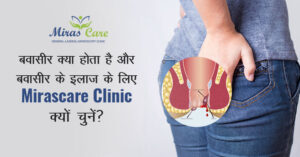Piles, anal fistula, and anal fissures are among the most common anal problems. All these three diseases come under proctology and have some common symptoms. However, each of these disorders is different and requires a different method of treatment. In this blog, we tell you the difference between piles, anal fistula, and anal fissure.
The Basic Difference
Anal fissures and fistulas are often mistaken as the same anal disorders. However, the fissure is a term that means a tear in the skin. Whereas, fistula refers to tube-like passages between organs. Therefore, an anal fissure is a small cut or a tear in the lining of your anus. This tiny cut causes severe pain and bright red blood during and after passing a stool.
On the other hand, an anal fistula is an infected tunnel between the skin and the anus. In easier words, it is a type of opening in the anal area filled with pus.
As for the piles, they inflamed veins in the anus and lower rectum. Hemorrhoids are another common term for piles. This problem can occur inside the rectum or develop around the anus. They can also become painful clots near the anus.
Now, let us tell about each of these disorders in detail. In this blog, you will find everything you need to know about Anal Fistula, Piles, and Anal Fissures. Right from their symptoms, treatment to all other important details, and how they are different from each other – you will find it all in this article.
What is Piles?
Piles (Another name is – hemorrhoids or Bawaseer) is one of the most common diseases among adults in today’s time. Owing to the sedentary and chair-ridden lifestyle that we live; piles have become a household name.
As mentioned above, piles are swollen veins in the terminal part of the anal tract. Bleeding in stools and feeling pain during bowel movement is among the first symptoms of piles. If you witness any of these symptoms, you must immediately visit a doctor.
In general, piles is not dangerous or life-threatening. However, if you ignore the condition for a prolonged period, severe complications may occur. At an initial stage, piles can even be cured at home with some lifestyle changes. However, at mild or higher stages, it requires proper medical treatment.
Moreover, it is only the doctor who can tell you about the stage of piles. Hence, consulting a doctor is a MUST if you witness any of the mentioned symptoms. We must also add that bleeding and pain while passing stools are not the only symptoms. There are many other symptoms of piles. They are mentioned below.
Piles Symptoms
A lump around the anus: There are two types of piles – external and internal. The external piles come with a swollen lump-like structure in or around the anus. It causes severe pain while passing the stool. The lump is mostly hard and might contain blood.
Pain during passing stool: Feeling pain or discomfort regularly during bowel movement might be a key sign that you have piles. Both external and internal piles can cause high-grade pain.
Bright red blood while passing stool: Seeing bright red blood in the stool or drips in the toilet is one of the most common symptoms of piles, as already mentioned. However, if the bleeding occurs only once – chances are that you had a spicy meal. However, if the bleeding persists for more than 2 days, it is likely to be a symptom of piles.
Slimy mucus discharge from the anus after passing the stool: Discharge of mucus after passing the stool is one of the most prominent symptoms of piles that you must not ignore.
Feeling bowels even after excreting out the stools: If you feel the urge to poop more or feel that the bowel is full even after passing stools, it is another symptom of piles.
Piles Causes
There are many causes that can lead to piles. They are as followed:
- Prolonged constipation
- Pregnancy
- Lifting heavyweights
- Prolonged sitting
- Anal intercourse
- Age factor
- Eating Low fiber diet
- Persistent diarrhea or coughing
Piles Treatment
The treatment of piles depends on the stage of the piles that the patient has. In the first stage, you can get rid of piles with dietary and lifestyle changes. For the advanced stages, the doctor may suggest a medicinal course or surgery. However, you must refrain from assuming the stage of piles without consulting a doctor. Doing so may lead to severe complications.
Losing weight, eating a fiber-rich diet, not lifting heavy weights are some of the common things one must do while suffering from piles. As for medicines and treatment, doctors may suggest painkillers, laxatives, ointment or piles-relieving pads.
However, when it comes to piles of surgery, there are several methods. The most preferred one is laser hemorrhoidectomy. Sclerotherapy, banding, open surgery, hemorrhoid stapling are among other surgical treatments for piles.
Also Read :
What are the 6 best benefits of Laser Hemorrhoidectomy for the Treatment of Piles or Bawaseer?
Anal Fistula
Anal Fistula is a passage in the anal area filled with pus. It mostly occurs to the person who has had an anal abscess before. The anal glands get infected and start oozing pus. The anal fistulas are actually the tunnel connecting the infected anal gland to the abscess.
Symptoms of Anal Fistula
- Pain in the anal area: Much like piles and other anal issues, fistulas also cause severe pain. You may experience excruciating pain while passing motion.
- Redness and swelling around the anus: This are another common symptom of anal fistulas. They cause redness and inflammation around the anus.
- Bleeding: Anal fistulas also lead to bleeding from the rectum.
- Fever: The infection in the anal gland lead to fever. If you witness the above-mentioned symptoms along with fever, you might be diagnosed with anal fistulas.
- Discharge of pus through the fistula (wet feeling in the anal area): In this condition, there is a discharge of pus through the fistula. Mostly the discharge is not directly felt but you may experience a wet feeling.
- Difficulty in controlling bowel movement
Anal Fistula Causes:
According to the National Health Service of United Kingdom, “Anal fistulas are usually the result of an infection near the anus causing a collection of pus (abscess) in the nearby tissue. When the pus drains away, it can leave a small channel behind.”
Below mentioned are some of the common causes of Anal Fistulas
- Crohn’s disease: It is a long-term condition in which the digestive system is inflamed.
- Colon infection
- Side-effect of radiation
- Prolonged sitting
- Obesity
- Infection caused due to TB or HIV
- The complication caused after a surgery near the anal area
Anal Fistulas Treatment:
Antibiotics are among the most successful treatment for anal fistulas. However, some patients may also require surgery to completely get rid of anal fistulas. Fistulotomy is one such surgical method to treat anal fistulas. It involves cutting open the entire length of the fistula in order to heal into a flat scar. The more advanced treatment is laser fistula treatment. It is a painless and hassle-free treatment option.
When it comes to fistulas, seton procedures are also common. In this procedure, a surgical thread called seton is placed and left in the fistula for some weeks. It helps heal the fistula and a further procedure is carried out to treat it.
Anal Fissure
An anal fissure is a tear or a cut around the anus. It goes without saying that is very painful. While passing a stool, if you feel that you are passing through broken glass – it might be a symptom of anal fissure. Just like anal fistula and piles, anal fissures also cause bleeding and one can see blood spots in the stool.
Moreover, when a person is suffering from an anal fissure, they may feel a burning sensation even hours after a poo. An anal fissure is mostly visible around the anal and comes with a skin tag.
Anal Fissure Symptoms
An anal fissure is not a rare problem. In fact, it is quite a common issue among adults. Here are the symptoms that will help you identify if you have an anal fissure:
- A lump of skin around the anus: As mentioned above, anal fissures is accompanied by a skin tag or a lump of skin.
- Sharp pain: Feeling sharp pain during bowel movement is one of the first and most prominent symptoms of anal fissure.
- Blood spots: If you often see blood spots in the stool or on the toilet paper, you might have an anal fissure.
- Itching or burning sensation: Persistent burning sensation around the anus is also a common symptom of anal fissure.
Causes of Anal Fissure
According to NHS, the causes of an anal fissure are as followed:
- Crohn’s disease or any other inflammatory bowel disease
- Having tight anal sphincter muscles – In this case, the tension the anal canal is increased which makes the anus more susceptible to tearing
- Persistent diarrhea
- Pregnancy – Anal fissures are common among pregnant women
- An anal fissure is also often a symptom of Sexually Transmitted Infections such as syphilis or herpes
Anal Fissure Treatment
Most of the anal fissure cases are not dangerous and can be treated at home. But first, you must visit a doctor who can examine the condition and accordingly advise the suitable course of treatment. The doctor may suggest some lifestyle and diet changes. In some cases, medicines such as ointment, injection or calcium channel blockers are also suggested.
In serious cases of anal fissure, some patients may also require surgery. Several studies have shown that surgeries are the most effective treatment for chronic anal fissures. The surgery to treat an anal fissure is called lateral internal sphincterotomy (LIS). The name may sound scary, but it is a simple surgery and causes minimal pain (lesser pain than the fissure itself).
Conclusion
Anal fissure, piles, and anal fistulas might have some common symptoms like pain around the anal area or bleeding in stools, but all three are completely different from each other and require different treatment.
Reference:
https://www.mayoclinic.org/diseases-conditions/anal-fissure/symptoms-causes/syc-20351424


